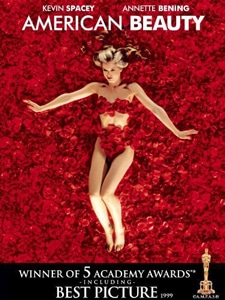Originally posted October 18, 1999; transferred to this site. Note the overly optimistic movie poster.
Lester Burnham (Kevin Spacey) is deep into mid-life crisis. Worse, as he tells us in voice-over, he’ll be dead within a year. Lester has a dead-end job, a frigid, always stressed-out wife (Annette Bening), and a sullen teen-age daughter (Thora Birch) who hates him.
Things start to brighten up when Burnham meets Angela Hayes (Mena Suvari), a friend and fellow cheerleader of his daughter Jane. After Lester overhears Angela remark that he is cute, and that she would like to have sex with him if he worked out a bit, his life changes. He quits his job, blackmails his employer into a generous severance package, buys the 1970 Firebird he always wanted, and takes a job flipping burgers.
Needless to say, this upsets his wife, Carolyn, who starts an affair with the local real estate mogul, Buddy Kane (Peter Gallagher).
Meanwhile, a new family has moved in next door, featuring a psycho drug dealer teen-age son (Wes Bentley) a seriously troubled retired Marine colonel (Chris Cooper), and his depressive zombie wife (Allison Janney).
Ricky, the son, likes taking videos, and soon fixates upon Jane as his favorite subject. At first, this turns her off, but since this is a movie, before long they’re getting together on a regular basis for a bit of mufky-fufky.
Hold onto your hats for the denouement…
When Carolyn and Buddy drive through the burger joint, and are smooching in the car, who do you think is working the window? Surprise, surprise, it’s Lester. His youngish supervisor, also at the window, yells out to the embarrassed wife, “You’re so busted!”
Speaking of windows, later on, the colonel observes Ricky doing something with Lester through a window. He thinks it’s homosexual activity, but it’s actually just a drug deal. When Ricky gets home, the colonel freaks, and beats up his son, throwing him out of the house.
A few minutes later, the colonel approaches Lester, and we are waiting for an eruption, but what we get instead is a good ol’ 1970’s cinema style homosexual kiss on the lips. Lester is startled, and tells the colonel that he must have gotten the wrong idea.
During all this, Carolyn is driving home, listening to her self- improvement tapes with their “I won’t be a victim” mantra, as she is clutching her gun.
Let’s see… Angela is spending the night at the Burnham’s, and Ricky and Jane are planning to run away together. Angela has a big fight with the other two teens, and falls into the waiting arms of Lester, who, naturally, does NOT have sex with her.
After all this, there is a close-up of a gun to his head, and you’re sure that it’s Carolyn at the other end. Lester is killed.
But, Land Sakes!! The killer is revealed to be the colonel, replete with gloves to protect him from AIDS (even though he has blood splatter covering the rest of his unprotected body.) If this all seems contrived, it comes across even worse in the movie.
That virtually all critics nationwide are praising this pic says a whole lot more about film critics than it does about American Beauty.
The dysfunctional family thing has been done earlier and better in The Graduate (1967) and Over the Edge (1979). The notion of the sexual braggart unmasked as a virgin (as in Angela’s last scene with Lester) has been done hundreds of times before, and the uptight latent homosexual martinet is another tired cliché.
How about the acting? The kids come off much better than the adults. Spacey performs his patented strong/weak good/bad guy routine that we’ve seen before in The Usual Suspects (1995) and The Negotiator (1998). Bening is just irritating beyond belief, while Janney and Cooper don’t get much to work with.
The film’s best perf is brought in by Suvari. Of course, she has the only normal role. As I’ve said before, it’s much easier acting the weirdo than playing a real person in crisis.
My heart does go out to both Suvari and Birch, who must bare their breasts, totally unnecessarily, in a sort of crypto kiddie porn experience. If the producers and marketers were trying to appeal to teen-age boys, these scenes, and these alone, might fill that bill.
No doubt, writer Alan Ball and director Sam Mendes kept congratulating themselves throughout the making of this pic as to how cool, hip, and sophisticated they are. But, really, more cogent glimpses of what’s wrong with America can be had better and cheaper via talk radio.
How sad that a movie which has been correctly derided as a combination of American Pie (1999) and Office Space (1999) can be taken so seriously by so many.
